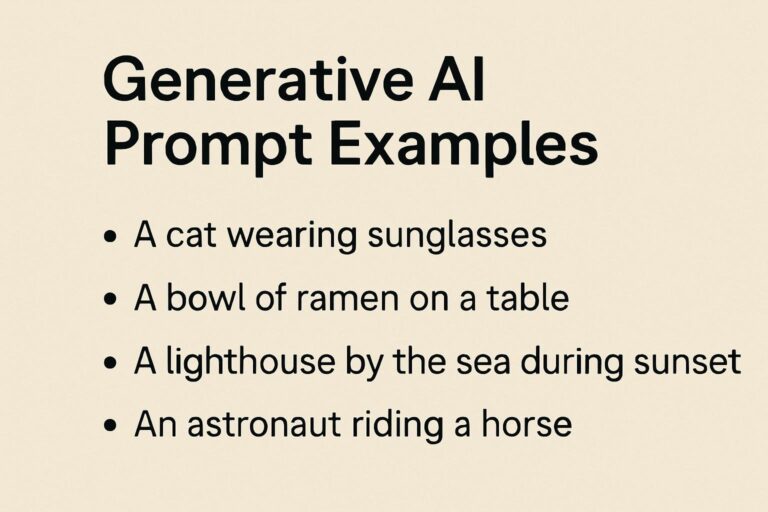Mastering the Art of Using Keywords in AI Prompts

Using Keywords in AI Prompts
AI personalization is remodeling the methodology we work collectively with experience, tailoring experiences to specific particular person preferences and therefore behaviors. By leveraging machine finding out algorithms, AI strategies can analyze big portions of info to predict shopper needs and therefore present personalised content material materials, strategies, but choices. The make use of of key phrases in AI prompts extra enhances personalization by guaranteeing that AI strategies ship further appropriate and therefore contextually associated responses, making a seamless and therefore fascinating shopper experience.
This diploma of personalization not solely enhances shopper engagement but so in addition fosters a means of connection between prospects and therefore firms, making each interaction further associated and therefore important. In the shortly evolving world of artificial intelligence, crafting environment friendly prompts is essential for harnessing the full potential of AI language models.
Whether you’re using AI for content creation, purchaser help, but info analysis, understanding strategies to make use of key phrases in your prompts efficiently can significantly enhance the excessive high quality of the output. This article will uncover the significance of key phrases in AI prompts and therefore provide concepts for optimizing your interactions with AI fashions.
Understanding AI Prompts

Keywords in AI Prompts
Keywords perform the linchpins of communication between prospects and therefore AI fashions, guiding the AI in the course of the desired context and therefore specificity of response. They act like beacons, illuminating the path to further associated and therefore tailored options that align with the shopper’s intent.
By fastidiously selecting and therefore incorporating the correct key phrases into prompts, prospects can dramatically reduce again the ambiguity that typically outcomes in generic but off-target responses from the AI.
AI prompts are the instructions but questions you current to an AI model to generate a specific response. These prompts can fluctuate in complexity, from simple inquiries to detailed, multi-part instructions. The key to a worthwhile prompt is readability and therefore precision, which is the place key phrases come into play.
The Importance of Keywords
1: Guidance and therefore Focus: Keywords perform the signposts that direct the AI in the course of the desired outcome. By collectively with specific phrases which may be associated to the topic but course of at hand, prospects can efficiently slim down the AI’s focus, guaranteeing that the generated content material materials is aligned with their intentions.
This targeted technique not solely improves the relevance of the responses but so in addition enhances the effectivity of the interaction, saving time and therefore lowering the probability of misinterpretation but irrelevant outputs.
Keywords perform focal elements that info the AI in producing associated and therefore useful responses. By collectively with specific phrases related to your topic, you help the AI understand the context and therefore intent of your prompt.
2: Reducing Ambiguity: Enhancing User Experience: Personalization through AI hinges on its means to adapt to specific particular person shopper preferences and therefore behaviors. By analyzing earlier interactions and therefore shopper info, AI strategies can tailor responses that resonate further intently with the shopper’s expectations and therefore wishes.
This not solely improves the basic shopper experience by making it absolutely, honestly really feel further intuitive and therefore responsive but so in addition fosters a means of connection and therefore perception between the shopper and therefore the experience.
Clear key phrases lower the chances of ambiguous but irrelevant responses. They current the AI with a clear understanding of the materials, lowering the probability of misinterpretation.
3: Enhancing Relevance: By tailoring content material materials and therefore interactions to the specific particular person’s preferences and therefore behaviors, AI personalization ensures that each shopper feels uniquely understood and therefore catered to.
This heightened relevance not solely improves shopper satisfaction but so in addition significantly will improve engagement, as personalised experiences often are likely to resonate with prospects on a non-public diploma.
Moreover, this technique may end up in extra sensible communication, as the AI’s responses and therefore methods develop to be further aligned with the shopper’s expectations and therefore wishes. Keywords help in narrowing down the scope of the AI’s response. This ensures that the generated content material materials is further aligned alongside together with your expectations and therefore requirements.
4: Improving Searchability: Enhancing User Experience: AI personalization extends previous mere key phrase matching to understanding shopper intent and therefore conduct patterns.
Through regular finding out and therefore adaptation, AI strategies can current strategies and therefore content material materials that resonate on a further non-public diploma, making interactions absolutely, honestly really feel further intuitive and therefore human-like.
This not solely improves the shopper’s satisfaction but so in addition fosters a means of loyalty and therefore perception in the course of the service but platform, because therefore it appears to ‘know’ the shopper larger over time. In functions like content material materials period and therefore search engine advertising, using the correct key phrases ensures that the output is optimized for engines like google, bettering visibility and therefore attain.
Tips for Using Keywords in AI Prompts
1: Be Specific: When crafting prompts for AI, specificity is important. The further precise and therefore detailed your key phrases are, the further tailored the AI’s responses might be. This means avoiding obscure but widespread phrases that may end result in a selection of outputs and therefore focusing as an different on space of curiosity, targeted key phrases that align intently with the desired content material materials but outcome.
By doing so so, you enhance the probability of producing supplies that is not solely associated but so in addition resonates with the meant viewers, thereby enhancing shopper engagement and therefore satisfaction. Use precise and therefore associated key phrases that straight pertain to the topic but question at hand. Avoid obscure but overly broad phrases which can end result in unfocused responses.
2: Contextualize: Understanding the shopper’s current state of affairs is important for AI personalization. By analyzing the context in which a shopper interacts with content material materials but firms, AI can tailor experiences that align with their speedy needs and therefore preferences. This could comprise considering parts reminiscent of the time of day,
location, gadget getting used, and therefore even the shopper’s present train to ship a personalised experience that feels intuitive and therefore properly timed. Provide adequate context spherical your key phrases to help the AI understand the background and therefore nuances of the topic. This can comprise together with a quick description but specifying the desired outcome.
3: Prioritize: As we delve deeper into the realm of AI personalization, it turns into important to acknowledge the significance of prioritizing the shopper’s preferences and therefore behaviors. By doing so so, AI strategies can efficiently curate content material materials, strategies, and therefore interactions that resonate on a further specific particular person diploma.
This prioritization not solely enhances shopper engagement by providing relevance but so in addition fosters a means of understanding and therefore connection between the shopper and therefore the platform, thereby elevating the basic shopper experience.
Identify the most vital key phrases related to your prompt and therefore assure they are — really prominently featured. This helps the AI prioritize these factors in its response.
4: Experiment and therefore Refine: Personalization through AI simply is not a one-and-done course of; it requires regular fine-tuning. By analyzing shopper strategies and therefore conduct, AI strategies might be taught and therefore adapt, making personalization further appropriate and therefore associated over time.
This iterative course of of experimentation and therefore refinement is essential for staying ahead of shopper expectations and therefore delivering a really individualized experience that resonates with each shopper on a deeper diploma.
Crafting environment friendly prompts is an iterative course of. Experiment with completely totally different key phrase mixtures and therefore constructions to see how they impact the AI’s output. Refine your prompts primarily based largely on the outcomes to realize optimum responses.
5: Avoid Overloading: Overloading the AI with an extreme quantity of knowledge but too a large number of instructions immediately may end up in subpar personalization. It’s needed to strike a steadiness between providing adequate context for the AI to generate associated content material materials and therefore preserving the prompt concise.
This ensures that the AI stays focused on the core personalization aims with out getting sidetracked by extraneous particulars. While key phrases are needed, overloading your prompt with too a large number of can confuse the AI. Strive for a steadiness that provides readability with out overwhelming the model.

Keywords in AI Prompts
Conclusion
In the realm of AI personalization, the even handed make use of of key phrases is akin to providing a map for the AI to navigate the big panorama of info. It’s about putting the correct chord between specificity and therefore adaptability, allowing the AI to understand the context and therefore ship personalised content material materials that resonates with the shopper.
By sustaining this equilibrium, we are going to harness the full potential of AI to create experiences that are not solely associated but so in addition deeply taking part, reflecting an understanding of specific particular person preferences and therefore behaviors.
Using key phrases efficiently in AI prompts is a skill that will significantly improve the excessive high quality of AI-generated content material materials. By understanding the perform of key phrases in guiding and therefore focusing AI responses, you probably can craft prompts that yield further appropriate, associated, and therefore useful outcomes.
As AI continues to advance, mastering this skill will develop to be an increasing number of needed for leveraging the full potential of artificial intelligence in various fields.




